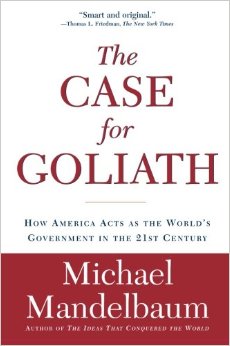A disturbing book that’s been touted in the major media in the United States is “The Case for Goliath: How America Acts as the World’s Government in the 21st Century,” by Michael Mandelbaum. He baldly states, “The American performance at world government is better than the alternative, which is that no one will do it.”
 That represents the prevailing view among American elites, revealing an obstinate hubris in the United States, as well as a monumental failure of imagination abroad.
That represents the prevailing view among American elites, revealing an obstinate hubris in the United States, as well as a monumental failure of imagination abroad.
Full of contradictions, Mandelbaum’s views are so wrongheaded that they shouldn’t deserve serious consideration. Yet this leading academic at the Johns Hopkins School of Advanced International Studies is merely expressing the dominant view in and of the United States.
The increasingly likely election of Donald Trump poses a challenge to the world even beyond the permanent war on terror that the United States unleashed on the world during Bush Administration.
The Obama Administration acquiesced to the status quo after initially calling the entire premise of the war on terror into question. Fittingly, it was reported this week that Barack Obama has become the longest serving wartime president. This despite the fact that American extrajudicial military activities are rightly defined as police actions, not war.
Speaking out of one side of his mouth, Mandelbaum says, “The United States doesn’t threaten other countries…it helps keep order in the world.” Speaking out of the other side of his mouth, he goes beyond even the doctrine of preemptive war that was the justification for invading Iraq: “The most plausible case for war is not because of something the other country is about to do, but because of something you think it might do in the future.” He calls it “preventive war.”
Such views wouldn’t be worthy of serious consideration except for 1: They reflect the thinking of most policy makers in America. 2: There is not a sufficient countervailing movement in the United States to stop them. And 3: The need for effective global governance grows more apparent and urgent every week.
The collapse of the international order is happening before our eyes; if the present trend continues, the international system, including the UN, cannot be salvaged. Where will genuinely global leadership come from?
Nations act in their own self-interest, not in the interests of humankind as a whole. Very powerful nations will therefore inevitably try to impose their will, according to their imperial interests, on the world. That produces enormous discord, disorder and “blowback,” as it has for decades with the US foreign policy, including global terrorism.
National self-interest cannot be the foundation for cooperation in the global society anymore than individual self-interest can be the basis for harmony in a community. If self-interest is the unchallengeable principle of political organization, and the immutable premise of human nature, then the country with the most power will always rule, and greed will always produce extreme disparity between rich and poor.
The increasing interconnectedness and instability in the world’s economic, social and political spheres demand a radical change in the attitudes of a sufficient number of human beings, psychologically overthrowing the historical dominance of blood and steel in man’s history.
Why is the United Nations failing? Seventy years of experience with the UN ideal attests to the futility of even five Security Council powers, much 200 nations, cooperating on the basis of national interest.
UN diplomats use a clever rhetorical device to cover the UN’s profound failing and institutional weakness. The perennial excuse from the UN is that it is only as good and effective an institution as its members, especially Security Council members, allow it to be.
The United Nations itself has no authority or autonomy to act, so the argument goes, and therefore criticism of the UN is really criticism of the nation-states that determine its policies and actions. That’s a classic vicious circle.
No group of nations, operating in their separate self-interests, can act in the interests of humankind. Therefore the principal of the sovereignty of humanity must be put forth to philosophically supersede and politically complement the UN in the form of a new, authentically global, non-power-holding body.
Effective global governance is a triad, and the emergence of a third component is indispensable.
Such a triad would involve: autonomous nation-states no longer assuming supreme authority and sovereignty; autonomous international political and economic institutions with limited but real power to legislate and enforce international law; and a non-power-holding global body of world citizens possessing great moral suasion and the capacity to hold nations and international institutions accountable to humanity as a whole.
For many reasons, real and symbolic, such a global body should be built in the evolutionary birthplace of humankind—East Africa.
On the political level, a tangible expression of a global polity will provide the new philosophical foundation and true policy leadership that the United Nations and international community urgently need for global governance in a global society.
At its core, the emergence of a global polity in East Africa will manifest and amplify a revolution in human consciousness, marking the shift away from man’s atavistic identification with particular groups as the basis of humankind’s political organization.
Martin LeFevre

